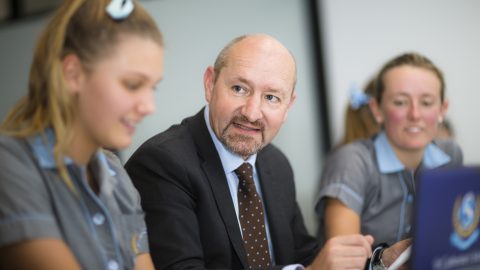From the Director of Curriculum Innovation and Development

Pedagogical Pyromania and the Iranian Hostage Crisis – it must be November!
November is the month of examinations, and it’s the month I most often reflect upon what education is all about. Anyone with a passing interest in education (or indeed anyone driving on the Monash recently with a passing interest in reading the advertising hoardings) will be familiar with this quote:
Education is not the filling of a pail but the lighting of a fire.
Of course, no one with a passing interest in education can agree upon whose quote it is, variously the honour has gone to Plutarch (very noble), sometimes even Einstein (why not? Just about every other quote on the internet is now one of Einstein’s) and a quick search of the Internet reveals (quite wrongly) the poet William Butler Yeats. But in essence, regardless of where the quote originates, it does capture what lies at the heart of authentic learning engagement – fire! Fire involves both science and art: the science of building a fire is understanding how fuel, heat and air work together; the art of building a fire is being able to regulate these three elements under any given circumstances, in any environment, to get and keep a blaze going. Teaching is also a science and an art, teaching also has essential elements to keep learning engagement ablaze and the skill of the educator is to regulate these. Until six weeks ago I was confident that I was an expert in pedagogical pyromania and then I did the unthinkable, I surveyed my students whilst a colleague observed my class! The responses were polite and affirming, indeed my lesson was rated as ‘very good’ and my colleague was constructive – a critical friend! But where was the pedagogical pyromania??! There was no Guy Fawkes bonfire, more a bit of kindling and a couple of matches on a damp evening.
And so I did the unthinkable sequel – I decided to use a nifty piece of technology (the swivel) and record myself teaching. Well there’s an experience! 75 minutes of watching yourself. When we do that we naturally focus on the ‘negative’ – I, for instance, was certainly having a bad hair day and I found myself (annoyingly) repeating myself in rapid succession; I found myself (annoyingly) repeating myself in rapid succession; I found myself (annoyingly) repeating myself in rapid succession. Annoying isn’t it? But there were positives too, after all it could have been a 90 minute lesson.
Observing colleagues and receiving student feedback are all part of the modern educator’s toolkit at St Catherine’s. We do these things not because ‘we have to’ but because ‘we want to’. We all want to be outstanding teachers, expert pedagogical pyromaniacs and, like good students, we do that through reflection and discussion. In the last three weeks I have been welcomed into the classrooms by half a dozen colleagues and I continue to learn. Be assured, education in that sense is certainly moving in the right direction. My goal for 2017 is bonfire building.
November though also makes me re-read the articles of one of the great education thinkers in the world today – Alan November. Alan teaches at Harvard and in one of his first classes each academic year he asks his students “can you Google?” He receives lots of rolling of the eyes but then he sets them this 15 minute task to prove they can: Alan asks them to research the Iranian Hostage Crisis and include at least two Iranian sources. Students tend to type into Google ‘Iranian Hostage Crisis’ verbatim – they do this because for simple questions this search technique reaps quick rewards; it’s an easy way out and doesn’t require much in the way of critical thinking. The irony of having millions of sources of information on a Google search, as far as November is concerned, is that the vast majority of students are satisfied with the ‘top’ site, the first on the pile. If it didn’t yield Iranian sources, 99% of students simply type in ‘Iranian Hostage Crisis Iranian Sources’. Most students don’t know that they can go to another country’s internet by typing in the two letter country code: au for Australia for example and ir for Iran; if you want a short-cut to sources type in the Google operator ‘site’. This means that by typing ‘site:ir Iranian Hostage Crisis’ we get Iranian sources – or do we? In Iran, the Iranian Hostage Crisis is not called that, but by going to Wikipedia we find that Iranians call the crisis, ‘The Conquest of the American Spy Den’. By typing in ‘site:ir Conquest of American Spy Den’ the task set is achieved. Students learn very quickly that they have a superficial understanding of Google searches. What Alan November likes most about this exercise is that students start to ask, “What else don’t I know?”
Now that’s the question I want to hear at the end of my lessons – that’s pedagogical pyromania. Have a great November.


